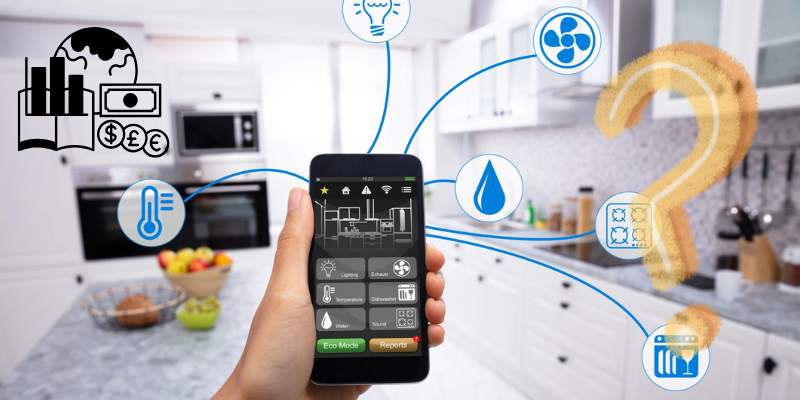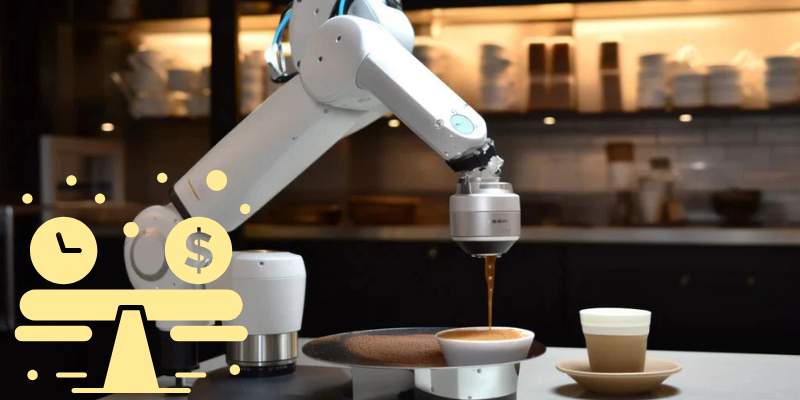The kitchen has always been the heart of the home. It’s where meals are made, conversations happen, and family members linger longer than they intend to. And in recent years, the rise of AI in home devices has promised to make that heart beat smarter.
Among the many futuristic inventions—robot vacuums, voice assistants, even ovens that talk back—the smart fridge stands out as a symbol of convenience-meets-technology.
But here’s the real question: are these sleek, touchscreen-equipped fridges truly making life easier, or are they just making our wallets thinner?
I’ve asked myself this more than once while standing in front of a $4,000 stainless steel refrigerator that can do everything short of filing my taxes.
Sure, it can track expiration dates, show me who’s at the front door, and even stream Netflix while I grab a snack. But sometimes I wonder: is it all just an overkill really?
Let’s dig in.
What Exactly Is a Smart Fridge?
If you’ve never looked beyond your traditional two-door fridge, a smart fridge might sound like a gadget from a sci-fi flick. But in plain terms, it’s a refrigerator with built-in AI-powered features, internet connectivity, and sensors designed to “help” with daily kitchen tasks.
Some features you’ll find:
- Touchscreens that double as family hubs.
- Cameras inside the fridge to remotely check contents.
- Automatic inventory tracking with alerts for low stock or expiring items.
- Recipe suggestions based on what’s inside.
- Integration with Cleaning AI Vacuum Roombas, ovens, and washing machines.
- Voice assistants like Alexa or Google Assistant.
In theory, these features promise to save time and reduce food waste. But does the reality live up to the marketing?
The Cost Factor: A Big Bite Out of Your Budget
Let’s be honest: a smart fridge isn’t cheap. While a decent mid-range traditional refrigerator costs anywhere from $1,000 to $1,800, smart fridges usually start at around $2,500 and can shoot up beyond $5,000.
For example, Samsung’s Family Hub refrigerators retail between $3,000 and $4,500. That’s basically the price of two regular fridges plus enough groceries to fill them for months.
So here’s the kicker: does the extra $2,000+ pay for itself in convenience?
Statistics That Paint the Picture
- According to Statista, the global smart appliance market was valued at $34.8 billion in 2023 and is projected to grow to over $108 billion by 2030 (Statista).
- Smart fridges specifically make up a growing slice of that pie, but consumer surveys show that price is still the number-one barrier to adoption.
I don’t know about you, but spending five grand on a fridge feels like one of those purchases that either makes you feel like royalty or makes you regret it every time your electric bill comes in.
Food Waste and Expiration Tracking: A Real Benefit or Just Hype?
Now, one of the strongest selling points of smart fridges is their ability to reduce food waste. You get notifications when your milk is about to expire or when your lettuce is turning sad and limp.
But here’s the tricky part: studies show that while technology can help, human behavior is often the bigger factor. According to the USDA, the average American household wastes about 31% of the food they buy (USDA Report). That adds up to over $1,800 per year for a family of four.
In that context, a fridge that nudges you—“Hey, you’ve got chicken thighs you forgot about”—could actually save money and reduce guilt.
But then again, do we really need a $4,000 machine to tell us that the yogurt we bought three weeks ago is probably not safe to eat? Sometimes old-fashioned common sense (or just a quick sniff test) works just fine.
Convenience vs. Complication
Here’s where things get messy.
Convenience Pros:
- Remote access: Ever stood in the grocery store aisle wondering if you’re out of eggs? A smart fridge camera lets you check.
- Recipe help: Some fridges suggest meals with what you already have.
- Family organization: The digital hub doubles as a family calendar and note board.
Complications Cons:
- Overreliance: What happens when the software glitches, and you forget how to organize your meals without it?
- Privacy concerns: Yep, your fridge might be collecting data on your eating habits.
- Repair costs: More tech equals more things that can break, and repair bills aren’t cheap.
So while the convenience is real, the added complexity sometimes feels like it cancels out the benefits.
Integration with the “Smart Home” Ecosystem
It’s not just about the fridge itself. The entire idea behind AI in home is interconnectedness. The smart fridge talks to your smart oven, which talks to your dishwasher, which chats with your Cleaning AI Vacuum Roombas.
In theory, it sounds like harmony. Imagine:
- Your fridge notices you’re low on chicken.
- It adds it to your grocery app.
- Your oven preheats itself when you schedule a recipe.
- Meanwhile, the Roomba runs a cleanup cycle after dinner.
But do we actually need this level of coordination? Or is it tech companies pushing the narrative that we can’t survive without gadgets syncing together?
Sometimes it feels like we’re living in a world where the fridge bosses us around instead of the other way around.
Energy Efficiency: Smarter or Just Hungrier?
This one’s a double-edged sword. Smart fridges often advertise energy-saving features, but at the same time, they consume more electricity because of their always-on connectivity and touchscreens.
The average traditional fridge consumes about 400-600 kWh per year. Smart fridges, depending on the model, can consume significantly more, especially if they have large displays.
So yes, you might save energy with AI-optimized cooling cycles, but the power drain from the fancy screen might offset that.
Personal Experience: The Novelty vs. the Reality
I’ll be honest: the first time I used a smart fridge, it was exciting. The touchscreen felt futuristic, and being able to peek inside without opening the door made me feel like I was living in the Jetsons’ world.
But fast-forward six months, and guess what? The touchscreen became more of a glorified whiteboard for grocery lists. Half the features I was once amazed by just sat unused.
It made me realize that sometimes, the better can be the enemy of the good. A fridge’s primary job is to keep food cold and fresh. Everything beyond that might be cool but not strictly necessary.
Maintenance and Longevity: An Overlooked Cost
Here’s something most people don’t think about: repairs. When a traditional fridge breaks, it’s usually a mechanical issue—compressor, fan, thermostat. A repair might run you $200–$400.
With a smart fridge? The costs are higher. A faulty touchscreen panel or software glitch could set you back $600–$1,200. And when manufacturers discontinue software support after a few years, you’re basically left with an outdated, overpriced regular fridge.
Social and Emotional Factors: Do Smart Fridges Change the Way We Relate to Food?
This is where the human side comes in.
- Mindfulness: Having a fridge nudge you to eat the spinach before it spoils can feel supportive.
- Family bonding: Some families genuinely enjoy using the digital hub to share notes, recipes, and reminders.
- Guilt factor: On the flip side, constant reminders of what’s about to expire can feel nagging. No one wants to be scolded by a machine after a long day at work.
There’s a delicate balance between helpful and annoying, and smart fridges often walk that line.
Washing Your AI-Powered Lifestyle
When you zoom out, the smart fridge isn’t just a standalone product. It’s part of a broader shift toward embedding AI into the very fabric of daily life.
We already have AI-powered washing machines, ovens, and vacuums. The home is slowly becoming less of a place you manage and more of a place managed by algorithms.
But with every new device comes the same dilemma: are we genuinely improving life, or are we outsourcing common sense to machines?
Sometimes, it feels like we’re washing your AI-powered lifestyle until it loses the authentic messiness of being human.
Final Thoughts: Overkill or Evolution?
So, are smart fridges worth it?
- If you’re a tech enthusiast who loves gadgets and doesn’t mind the price, then yes, it can be fun and sometimes genuinely useful.
- If you’re on a budget or prefer simplicity, then maybe not—it could be an overkill really.
Personally, I see the potential. But I also see a future where every appliance in the home is vying for my attention, nudging me, updating me, and frankly overwhelming me.
Sometimes, a simple fridge that just keeps the milk cold feels like the real luxury.


